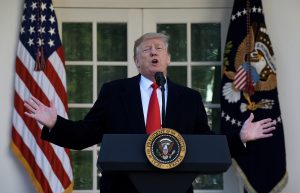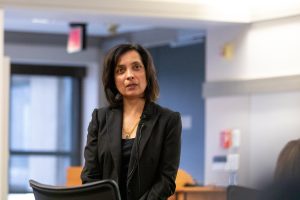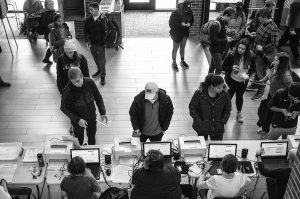Bernie Sanders returns ‘political revolution’ to Iowa City
Sen. Bernie Sanders, I-Vt., kicked off his first Iowa tour of his 2020 campaign. He stuck to his economic populist message but added more inclusivity planks in his stump speech.
Sen. Bernie Sanders, I-Vt., addresses a crowd at the Iowa Memorial Union. In his first Iowa stop of his 2020 presidential campaign, Sanders drew on many 2016 campaign promises like free college tuition.
March 8, 2019
Sen. Bernie Sanders, I-Vt., said he would bring the political revolution back to Iowa ahead of the 2020 caucuses, as he embarks on his second campaign to win the Democratic nomination for president.
At the IMU on March 8, Sanders brought back many similar ideas from his 2016 campaign, including calling for free tuition for colleges and universities, and reducing student debt. Sanders also painted his campaign as the opposite of President Trump’s, saying his campaign will be all-inclusive.
“Donald Trump and his political allies want to divide us up by the color of our skin, by the country of our origin, by our gender, by our vision, and by our sexual orientation,” Sanders said. “This campaign is going to do exactly the opposite.”
Claudio Mema, 27, a member of the UI chapter of the Young Democratic Socialists of America, compared Sanders’ 2016 campaign — which Mema supported — to his speech. Mema said he liked that Sanders used more inclusive language, especially after some staffers on Sanders’ 2016 campaign raised concerns about a culture of sexual harassment and violence. Sanders apologized publicly in a tweet Jan. 10.
“In 2016, no one knew him, so his main focus was economic injustice,” Mema said. “Now that he is more well-known for his position on that, he’s focusing on inclusiveness.”
About 24 hours after announcing his 2020 campaign, Sanders raised more than $6 million from more than 225,000 donations, according to his campaign — more than any other 2020 Democratic candidate raised out of the gate at the time.
Sanders, who was introduced by two UI Democrats members, acknowledged his favorability among young voters in 2016. In caucuses and primaries nationally, he outperformed both Democratic candidate Hillary Clinton and Republican candidate Trump among young voters, according to a study from CIRCLE at Tufts University.
Sanders ticked off a list of policy goals in his Friday campaign stop that echo his 2016 run, including regulating Wall Street, raising the minimum wage, implementing Medicare for all, addressing climate change, making tuition free, and bringing down prescription-drug prices.
Sanders referenced other presidential candidates endorsing universal health care and the Green New Deal, saying that when he announced his first campaign in Iowa, polling at 3 percent, his ideas were considered radical.
RELATED: Iowa Caucuses Candidate Tracker
“Those ideas that we talked about here in Iowa that seemed so radical at that time. Today virtually all of those ideas are supported by a majority of the American people,” Sanders said. “They are ideas that Democratic candidates from school board to presidential candidates are running on today and all of that began right here in Iowa.”
In 2016, Clinton narrowly defeated Sanders in Iowa by 0.3 percent, according to results that night.
UI senior Chris Wieneke, who is an independent, said he had hoped to hear more of Sanders’ plan for how he would implement his ideas.
“He said a lot of things he wants to do, which is great, but not how he plans to accomplish them,” Wieneke said.
Two first-time voters, Mackenzie Pattrige and Emily Robinson, said they hadn’t decided who they would caucus for, but wanted to hear what Sanders had to say.
Pattrige said she really liked Alexandria Ocasio-Cortez, and likened Sanders’ policy positions to the first-term Democratic representative from New York, but said she was hesitant to pledge her support for him because of his age.
“Before we left, I told my mom I wasn’t likely going to [caucus] for him because he’s an older candidate,” she said.
If elected, Sanders would be 79 by the time he took office. Trump, by comparison would be 74 by November 2020.
Robinson said she was interested in Sanders’ position on health care and livable wages.
“Soon I’m going to have to pay for my own health-care bill and have my own wages, and if I can’t afford those things I won’t survive,” she said.
The pair are Cedar Rapids Kennedy High School seniors, and said while they hadn’t decided who they would caucus for yet, they definitely planned to turn out in 2020.
Scott Siegling, 53, said he believed Sanders would be the one who could win against Trump in 2020.
“I’m a big supporter of his whole platform pretty much,” said Seigling, who said he left the Democratic Party, but would likely rejoin in order to caucus for Sanders.
Thursday, Sanders stopped in Council Bluffs, and Saturday the senator will round off his tour in Des Moines.






